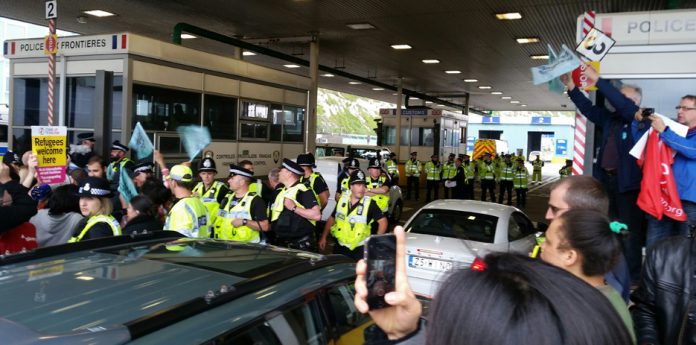THE UK government ‘needs to pay much more attention to establishing safe and regular routes for people to reach safety and their loved ones in the UK,’ said the Refugee Council.
Commenting on May government plans to spend an extra £44.5m beefing up Channel border security, Dr Lisa Doyle, Director of Advocacy at the Refugee Council, said: ‘It is right that the UK and French government continue to seek ways to ensure people receive protection and access to support and services.
‘Any measures taken by governments to protect their borders, be they in France or in the UK, should not come at the expense of safe routes for those in need of protection. It is vital that people seeking asylum who are eligible to come to join close family members in the UK under the Dublin regulation should be quickly identified and the process made simpler than it has been to date.
‘The government needs to pay much more attention to establishing safe and regular routes for people to reach safety and their loved ones in the UK. This includes widening the definition of family members eligible to reunite under Refugee Family Reunion rules which will mean that people are not forced to risk their lives in order to reach safety.’
The £44.5m will be spent on fencing, CCTV and infrared detection technology in Calais and other border points. It was announced as French President Emmanuel Macron visited the UK for a summit with PM Theresa May.
Thursday’s summit prompted fresh scrutiny of the border arrangements between France and the UK. During last year’s French election campaign, Macron said he wanted to renegotiate or scrap the 2003 Le Touquet agreement, which established French border controls in Britain and UK controls in Calais.
The agreement means undocumented refugees who are barred from entering the UK, stay in France, many in makeshift camps. Up to 700 refugees are in the area, despite the previous camp having been dismantled in 2016.
The UK government is already thought to have spent over £100m on security in the area over the last three years, and officials said the number of illegal attempts to enter the UK fell from 80,000 in 2015 to just over 30,000 last year. A Home Office spokeswoman said the latest investment was ‘about investing in and enhancing the security of the UK border’.
Diane Abbott MP, Labour’s Shadow Home Secretary, speaking in response to reports of a new deal on Calais refugees, said: ‘This new attempt to address the refugee crisis in Calais is in reality an admission of failure.
‘We have repeatedly been told that security measures would solve the problem, but it has just shifted it from Calais to Sangatte and back to Calais again. We need humane treatment of all these people, safe and legal routes for genuine refugees and the UK government needs to honour our moral obligations by taking our fair share of refugees.’
Earlier last week, Refugee Action responded to the Home Affairs Committee’s wide-ranging report on immigration. The charity, which supports refugees and people seeking asylum in the UK, said it welcomes the committee’s recommendation that the government upholds the principle of asylum and establishes a permanent resettlement scheme based on the current programme welcoming refugees affected by the conflict in Syria, which enjoys strong public support.
Stephen Hale, chief executive of Refugee Action, said: ‘We strongly support the committee’s calls for the government’s successful Syrian resettlement scheme to be turned into a permanent programme and expanded to welcome refugees affected by conflict and persecution in other countries.
‘In the middle of the world’s worst refugee crisis on record, we have a responsibility to increase current levels of resettlement beyond 2020. This report shows Brits are compassionate and believe we should continue to protect those forced to flee conflict and persecution.
‘But it is essential that all refugees in Britain, no matter how they arrive, have the opportunity to contribute to their new communities. The committee is right to highlight the scandal of cuts to funding for English language lessons and we welcome their recommendation for investment in this crucial area.’
The MPs’ report said: ‘The success of the Syrian Vulnerable Persons Resettlement Scheme shows that a well-funded, well-organised refugee programme can attract public support. This is evidenced by the number of local authorities signing up to the Scheme, under which additional funding is provided to them to provide individuals with housing and access to education, the job market and mainstream services.
‘There should be no diminution in the UK’s approach towards its international humanitarian obligations as it leaves the European Union. The UK has a proud tradition in providing support to those fleeing persecution and the principle has widespread public support
‘The principle of asylum – with the internationally recognised degree of evidence required – must be upheld
‘The government should make every effort to honour its existing commitments to bring unaccompanied children from Europe and elsewhere, both as part of the Dubs scheme and the Dublin III Regulation but also through family reunion routes within and outside the Immigration Rules.
‘We recommend that the government does more to challenge public misconceptions about people seeking asylum. In particular, a much clearer differentiation must be made between asylum and migration for other reasons.
‘Clear public information should be provided on the entitlements, rights and number of asylum-seekers compared with other migrants to combat myths. A failure to do so risks harming support for asylum and refugee policy. As a minimum, people who enter the UK for humanitarian purposes should not be included in headline figures of net migration including, while it remains in use, the net migration target.
‘A resettlement scheme along similar lines to the Syrian Vulnerable Persons Resettlement Scheme should be established on a permanent basis, in collaboration with the United Nations High Commission for Refugees, which would apply to refugees from other countries.’
